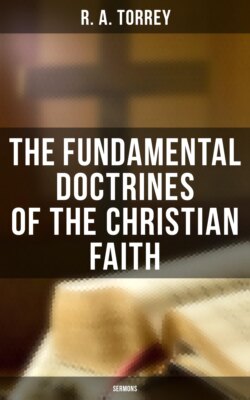Читать книгу The Fundamental Doctrines of the Christian Faith (Sermons) - R. A. Torrey - Страница 5
На сайте Литреса книга снята с продажи.
I. THE WORK OF THE HOLY SPIRIT IN APOSTLES AND PROPHETS DIFFERENT IN CHARACTER FROM HIS WORK IN ALL OTHER PERSONS
ОглавлениеTable of Contents
The first thing that the Bible teaches on this point and claims for itself is, that the work of the Holy Spirit in apostles and prophets, in the various human authors of the different books of the Bible, differs from His work in other men, even in other believers in Christ. It teaches that the Holy Spirit imparts to apostles and prophets an especial gift for an especial purpose. We find this clearly taught in 1 Cor. 12:4, 8-11, 28, 29, where we read, "Now there are diversities of gifts, but the same Spirit. . . . (8) for to one is given through the Spirit the word of wisdom; and to another the word of knowledge, according to the same Spirit; (9) to another faith, in the same Spirit; and to another gifts of healing, in the same Spirit; (10) and to another workings of miracles (powers); and to another prophecy; and to another discerning of spirits; to another divers kinds of tongues, and to another the interpretation of tongues; (11) but all these worketh the one and the same Spirit, dividing to each one severally even as He will. . . . (28) And God hath set some in the church, first apostles, secondly prophets, thirdly teachers, then miracles, then gifts of healings, helps, governments, divers kinds of tongues. (29) Are all apostles? are all prophets? are all teachers? are all workers of miracles?" This chapter is the fullest and clearest chapter in the Bible on the subject of the various gifts of the Holy Spirit. It is the classical chapter on the whole subject, and the teaching of these verses is as plain as language can make it, and it states in terms, the meaning of which is unmistakable, that the gift bestowed on apostles and prophets differed in kind from the gifts bestowed on other believers, even though those believers were filled with the Holy Spirit. Not only did the work of the Holy Spirit in the apostles and prophets differ from His work in men of genius, but even from His work in other believers. These verses make it as plain as day that the doctrine which has become so common and so popular in our day, that the work of the Holy Spirit in preachers and teachers and in ordinary believers, illuminating them and guiding them into the truth and into the understanding of the Word of God, is the same in kind and differs only in degree from the work of the Holy Spirit in Apostles and Prophets is thoroughly unscriptural and untrue. This doctrine overlooks what is here so clearly stated and so carefully elucidated, that while there is "the same Spirit" "there are diversities of gifts" "diversities of ministrations," "diversities of workings" (1 Cor. 12:406 R. V.) and that not all are Prophets or Apostles. (1 Cor. 12:29.)
Those who desire to minimise the difference between the work of the Holy Spirit in Apostles and Prophets, and His work in other men, often refer to the fact that the Bible itself says that Bezaleel, the architect of the tabernacle, was to be "filled with the Spirit of God, in wisdom, and in understanding, and in knowledge, and in all manner of workmanship," "to devise the work of the tabernacle" (Ex. 31:1-11), as a proof that the inspiration of the Prophet does not differ in kind from the inspiration of the artist or the architect. This argument at first glance seems plausible, but when we bear in mind the facts about the tabernacle, especially the fact that the tabernacle was to be built after the pattern shown to Moses in the mount (Ex. 25:8, 9, 40) and that therefore it was itself a revelation from God, a prophecy, a setting forth of the truth of God, the argument loses all its force. The tabernacle was the Word of God done into wood, gold, silver, brass, cloth, skin, etc., just as truly the Word of God and the revealing of God's truth as if the truth were printed on a page. So, of course, Bezaleel needed to be inspired, he was a prophet, a prophet who uttered his prophecies in the details of the tabernacle. There is much reasoning about inspiration to-day that appear at first sight very learned, but that will not bear much scrutiny or candid comparison with the teachings of the Word of God. There is nothing in the Bible more inspired than the tabernacle, and if the destructive critics would study the tabernacle more carefully and thoroughly they would be led to give up their ingenious but untenable theories, not only about the construction of the tabernacle, but about many other things as well. I have never heard or known of a single destructive critic who had ever given a thorough study to the real meaning of the tabernacle in all its parts, or who had any considerable understanding of the types of Scripture. I have challenged the critics in the University centres of England, Ireland and Scotland to name one single destructive critic who had ever made any thorough study of the types, and no one has ever attempted to even suggest one.
